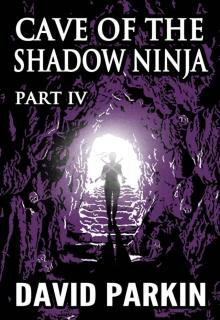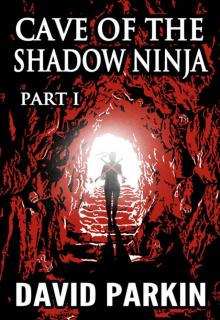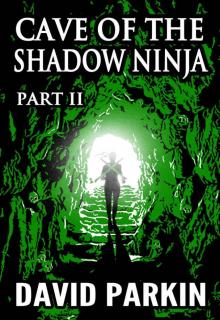- Home
- David Parkin
Cave of the Shadow Ninja: Part II Page 3
Cave of the Shadow Ninja: Part II Read online
Page 3
Each boy straightened like a soldier as the conscript scowled through spectacles perched on a pointed nose and stepped outside. He wore robes made from the finest Kaitian silk, died bright red and adorned with golden filigree.
He nodded a quick “Hello” to the mayor, who had appeared for the festivities, then walked at a brisk pace down the long semi-circular rows of children. As he passed each boy, they stood up as straight and tall as their might would allow short of actually leaping into the air. Once the man made it to Ping’s row, Ping followed suit, though he didn’t understand why. Like all the others, the conscript passed Ping by without so much as slowing down or glancing in his direction.
“Of course,” an old man grumbled behind him, “the boys of Paoyang have too stable a home life to be chosen. He’ll find what he’s looking for in some stinkwater province where they use their children’s heads to wash laundry.”
Ping turned. “Chosen for what?” he asked, trying his best to keep from staring at the sizable goiter jiggling beneath the old man’s chin.
“Ah, gee!” he barked, “are you too stupid to know why you’re here, boy? The young emperor is taking a sho-hai.”
“A what?”
“A sho-hai!” he repeated, annoyed, “a conscripted playmate, chosen to live at the palace with his Excellency.”
“Like, a servant?” Ping scoffed. “Why such fanfare for a job scrubbing chamber pots?”
The boy beside Ping scoffed as he relaxed his posture.
“No!” the old man wailed, “a sho-hai sleeps in a palace bed, takes a palace bath, eats palace food! He gets a palace education and an advance in his class, just to play pick-up-sticks with the child emperor.”
“Eat palace food?” Ping said with awe.
“Ah, gee!” the old man sneered again, “why do boys only care about the food?”
Once Ping finally understood the importance of this affair, his interest galvanized. Why didn’t mother tell me? he thought, as the visions of all the meat wagons, bakery carts, and fruit and vegetable deliveries he’d seen heading toward the palace frolicked though his head.
Suddenly the boy felt sick. “He walked right past me,” Ping said desperately. “He didn’t even look!”
“I told you,” the old man griped. “They want laundry heads. You should be grateful you don’t match up.” Ping stomped his foot as he looked to the conscript quickly making his way down the row. The boy was growing desperate. Something had to be done.
“Hey!”
Ping slapped his hand over his mouth, but when the sound of his disturbance echoed off the buildings in the square, he knew he was too late to catch the outburst.
For a heartbeat, there seemed to be an oxygen shortage on the streets of Paoyang as the he entire population made one, synchronized gasp. Ping watched in horror as the conscript stopped in his tracks back down the row, marching back toward him. He clenched the boy’s forearm with bony fingers and pulled him from the ranks.
For the next few seconds, the flurried whistle coming from the man’s nose seemed the only sound for miles.
“Well?” The conscript finally hissed with a thundering voice. Ping stole a glance toward his mother and instantly regretted doing so. She looked as if the soul had been burned right out of her face, and Sampot, whom the conscript hadn’t even reached yet, looked red-hot enough to have done it.
The boy took a deep breath. “Y-you didn’t even look at me, sir.”
The crowd gasped again. Ping expected the conscript to begin changing colors like Sampot but surprisingly, it seemed as though man’s anger was fading. Was that a look of relief flashing past his eyes?
There was no answer, so Ping continued. “We,” he stopped himself and started over, “I came here to be considered as a playmate for the king.”
“Yes, and?” the conscript questioned, annoyed.
“I would like to be considered, not just walked passed.” At this, the crowd waved together with exasperation like the ocean set he’d once seen when he and Sampot snuck into a kabuki theatre.
The conscript knelt to Ping’s level, undoubtedly scuffing his costly robes in the process. “Do you know the emperor’s favorite food, boy?”
“No, sir,” Ping answered, feeling the heat from the agitated crowd on his back.
“It’s fried duck intestines. What’s your favorite food?” the conscript asked.
“Uh,” Ping thought a moment, trying not to make a sour face at the idea of eating duck intestines, “steamed buns with pork,” he said.
“Not fried duck intestines?” the conscript asked.
“I’ve never had them,” Ping answered, honestly. “But they sound foul.” The crowd reacted again as disappointed shaking heads rippled around Ping like pebble thrown into still pond.
The conscript stood. “Who is responsible for this boy?” he asked the quieting crowd that was desperate to find out themselves.
After a long moment of agony, Ping’s mother stepped forward from the judging multitude and walked slowly toward them.
“Madam,” the conscript asked, “it has been charged to me by the emperor’s advisors at length, to find a boy that shares common tastes and interests with his Excellency while, at the same time, demonstrating the attributes of a listener. ‘One who obeys, and one who sits still.’ I’m afraid your son here is the boy furthest from that description that I have encountered in my entire, exhausting search.”
Ping’s mother nodded, trying to keep it together.
“Sir,” Ping said to the conscript in an attempt to take the focus off his mother. “I thank you for considering me.” Ping stepped back in line with the other boys, but the conscript remained, lifting a finger in the air as if to acknowledge a thought in the back of his mind.
“However,” he added, as the crowd froze once more, “a sho-hai best suited for the emperor’s advisors is not, by any means, a sho-hai best suited for the emperor himself. His Excellency needs a companion with his own opinions and tastes to present arguments. He needs someone to demonstrate that there are people who won’t listen to him just because of his status. The emperor needs to understand that there are people in this world who refuse to be overlooked. And, perhaps most importantly,” the conscript continued, “the emperor needs to understand that there are much more palatable foods than fried duck intestines.”
The conscript took Ping’s hand. “Young man,” he continued with pride, “I, and the whole of Kaito, would be honored if you served as sho-hai to his Excellency, the Emperor.”
There was no celebration that day. The crowd didn’t breathe, and neither did Ping as he and the rest of them tried to comprehend how a precocious young man’s outburst had somehow awarded him a gift that was only bestowed once in a generation.
SINCE HIS ENCOUNTER with the Ninja, Ping had thought of that day in the town square frequently. As he stood beside the emperor in the great throne room, with his back and shoulder still aching, he could still scarcely believe all that he had been afforded since that fateful day.
Inside a crack in the cliff, in which the great palace was built, the throne room stood as the largest chamber in Pylo. Despite the lanterns shimmering off the polished red wood floor, the great rock walls and ceiling gave the room a cold and empty feeling. This was a room in which most Kaitians would never set foot, but as Ping stood at its terminus, he recalled playing tag here as a child, running barefoot with Han as Jin-Po and the other advisors tried desperately to redirect their energy. “Sacred remembrance!” was one of the famous phrases Jin-Po’s would yell at the young boys, a concept Ping was still proud that he had never adopted.
The emperor’s throne, fashioned with polished slabs recovered from the granite walls, stood as the beautiful focal point in the room. Yet as the emperor reminded Ping earlier that morning, since the attack the seat had become as uncomfortable emotionally as it was physically. Over the last few days, the great door at the opposite end of the cavern opened over and over, each time revealing another broken citize
n bearing bad news. This time, as the sound of creaking hinges filled the rock-faced chamber, a battle-worn soldier appeared and made the long walk down the center of the room toward the emperor’s feet.
“Name?” Han’s echoing voice called to the man as he limped toward them.
“Shoc-Ti,” the man responded, too far away for Emperor Han to recognize.
“Commander in the northern army,” Ping offered, identifying him by name. “Your work with the trappers is as dangerous as their prey.” Shoc-Ti returned a bow that served as both thanks for Ping’s recognition and a notice that the news the soldier bore was too grave for pleasantries.
The sight of Shoc-Ti’s scarred and bloody frame was all Ping needed to see to know that the bad news continued across their land.
“The Ninja,” Shoc-Ti offered as he knelt at his emperor’s feet, “we scouted the Black Moors for three days.”
“Why the moors?” Ping interrupted. “They’re miles from the trade road.”
“I mapped the paths least-used by traders,” Shoc-Ti responded, attempting to keep upright despite his injuries. “We kept to footpaths, avoiding roads accessible by wagons and horses. It was my theory that the thief might have been taking care to avoid anywhere a supply train could deliver an army.”
“Smart,” Ping said.
“And?” the emperor prodded.
“We were right to do so,” Shoc-Ti continued. “On the fourth night, I spotted a shadow on a hillside behind us. Turns out the Ninja had kept pace on our tail to avoid detection.”
“Also, smart,” Ping said again, growing more impressed and intimidated by the thief with each story he heard.
“From the thief’s position behind us, he removed the runners I sent to inform Captain—” Shoc-Ti paused and started over, his exhaustion affecting his speech, “to inform your men, Captain.”
“He killed the runners?” Ping asked.
“No,” Shoc-Ti corrected, “he confiscated their written messages and weapons and gave them a warning not to return to our regiment. Later, we discovered that one had attempted to ignore his demands. The man won’t walk again, sir.”
After Shoc-Ti’s report, Ping ordered him and his regiment to rest and watched the soldier make his way back across long room. The captain decided not to tell Shoc-Ti that he and his men were the lucky ones. It seemed, from the stories they’d heard, some regiments that had encountered the black menace were killed outright with no warning or survivors. Others, however, had escaped unharmed. At last count, the Ninja had taken eighteen soldiers, with unsubstantiated reports of civilian deaths in much higher numbers.
With every word Ping was forced to hear, he became less and less patient with bad news. By now, there was no doubt the thief had reached the Backbone, and time was running short; however, reminding the emperor of this was a useless endeavor. Ping understood the emperor’s strategy of keeping him here to stave off any would-be worm thieves striking while the guard was distracted. After days without an incident, Ping began to worry that Han chose to keep him close in fear for his own safety. As Ping thought this over, a sudden ruckus burst from the doors across the hall, and two men fell into the room on top of each other.
“Noo!” a voice called as the emperor stood, and Ping pulled his sword. Jin-Po’s round shape was immediately recognizable as he attempted to wrestle a disheveled and unwashed man back out the doors.
“My Emperor! Please!” the man’s desperate plea echoed across the chamber as Ping advanced. Jin-Po, already out of energy, lay flat on his back, holding onto the commoner’s ankle like a hungry dog, each step dragging the advisor a few inches across the floor.
The distraught man, dressed in rags, with the marque sun-bleached hair of a potato farmer, greeted the tip of Ping’s sword like a vision of deity. “My lord!” the man begged, throwing his hands in the air and falling to Ping’s feet. “Please!”
Knowing the emperor’s usual reaction to situations like this, Ping shot him a quick look of reassurance before addressing the hysterical man. “My name is Captain Ping, citizen. Now what’s the meaning of this?”
“Arrest him!” Jin-Po interrupted as the large man attempted to right himself. “He was to wait until—” Ping’s raised finger cut off Jin-Po, reminding the advisor that he had no authority here.
“Captain Ping!” the farmer exclaimed. “Please, I am Chen. I’ve been riding all night!”
“Let him go, Jin-Po,” the emperor called as he approached. Once he was free of Jin-Po’s grasp, the farmer rushed the emperor and fell at his feet with the desperation of an innocent man at the gallows.
“Please, my Emperor,” he begged, “my farm, my children!”
“Calm yourself,” the emperor said as he knelt beside Chen who stained the centuries-old rug running the length of the room with his tears. “Start from the beginning.”
Han put his arm around the man as he quivered a moment, attempting to wrangle his thoughts. “Something black. It’s heading this way. Something evil!”
“We know,” Ping stated, “a Ninja.”
“If only a thief!” Chen shivered, visibly struggling to keep his sanity in check. “No, this is a force,” he swallowed, “moving like a ghost in the water.”
“Poison?” the emperor asked, striving to make sense of this.
“It changes whatever drinks it. Changes it into—” Suddenly, the farmer’s eyes grew cold. “My daughter,” he shivered, “she trains monkeys. She didn’t notice until—” The man’s face cringed in horror as he relived the memory. “Now she is dead!” Han held the man as the farmer’s sadness finally robbed him of his strength.
“How does it move in the water?” Ping pushed, trying to understand.
“Streams,” Chen forced through his hysteria, “rivers, lakes. It seeps down from the northwestern farms. It has no smell.”
“No smell?” Ping asked.
The captain knew as he watched the man’s face empty of all emotion that he could offer nothing more. The captain had been around long enough to recognize the moment one lost the battle with madness.
As they watched the guards take the poor farmer to the palace infirmary, the emperor spoke, cool and distant. “Jin-Po, order the guard to gather outside Merv.”
Ping caught his breath, unable to comprehend this decision. “Emperor . . .” he said.
“If this isn’t fixed soon,” the emperor responded, “we march on Bushan.”
“Yes, your Excellency,” Jin-Po chirped, still straightening himself from the confrontation.
Ping turned to Han. “Let me go,” he begged. “I’ll fix this.”
“You’re about to command an army to war, Captain,” the emperor responded with a slow and deliberate tone. “You will do so from your post here at the capital. I’ve had enough of your stonehearted, ‘dying with your men on the field of battle,’ garbage. You are the captain of the Royal Guard and your nation needs you here.”
“But—”
“I don’t need to remind you,” the emperor interjected, “that disobeying an order from your emperor comes by way of an executioner’s ax?”
The blackness the farmer had brought with him grew so thick in the room Ping feared it would turn him and the emperor toward the darkness if he didn’t stay quiet.
This is an overreaction, Ping thought. Surely, there isn’t actual poison turning living things to monsters out there. Ping thought about what the farmer had said for a moment before one word stood out, the “smell,” Ping spoke the word slowly and deliberately.
“What?” the emperor asked.
Ping’s theory bubbled too hot and fast for a response as the captain looked to the door across the throne room. Suddenly, as the answer materialized in his mind, everything that lay beyond it became more important than anything in both worlds, including the emperor’s and Ping’s own lives.
Ping had no choice. He turned and marched toward the door defiantly.
“Ping!” the emperor called as he passed the palace aides, carrying C
hen.
“I will end this, Emperor!” Ping called over his shoulder, not bothering to look back. “Cut off my head if you have to but do it when I get back!” Like the time in the village square, Ping scarcely believed the heated comment had come from his mouth until the echo from the stone walls returned it to his ears. “No matter,” he reminded himself as the great doors closed at his back, trapping his insubordinate words inside the throne room with the emperor, “however this ends, I won’t be alive to see it.”
Ping expected the guards to seize him at any moment as he marched down the darkened corridor on his way to the great hall. As he moved, he passed the door to the palace infirmary, another room in Pylo in which Ping had spent a great deal of time as a boy.
As he passed the hardwood door, he recalled the heavy disadvantages that came with the “privileged” life of the emperor’s playmate.
On his first night in the palace, Ping learned that the word sho-hai, when translated from the old tongue meant “a child of penance,” or more accurately, “a whipping boy”—something the old man and his goiter failed to mention that morning when he was a boy.
The ancient laws of Kaito stated that the sitting emperor may not receive punishment for any reason. But a concurrent law ordered that, for every offense, there must be retribution made. In that case, if the emperor broke a rule by, say, damaging a sacred relic while flying a kite through the palace armory, the punishment, no matter how severe, fell upon Ping to bear. The conscript referred to it as the “duty of reciprocity.”
The young emperor found the concept of a consequence-free life fascinating for Ping’s first few years at the palace. He spent many months limping up and down the stairs to that door with his feet, knuckles, and behind bandaged and bruised from his long sessions under the whistles and cracks of Jin-Po’s bamboo reeds.
As the boys grew older and the emperor began to understand the pain Ping had endured at his expense, the practice changed from a license to run amuck to a strategy only implemented when either Ping and the emperor got in trouble together, or when Han thought Ping deserved a thrashing or two. Maybe this time, Ping thought as he headed for the palace gate, I’ll finally be able take a whipping Han truly could never bear.

 The Nose That Nobody Picked
The Nose That Nobody Picked Cave of the Shadow Ninja: Part IV
Cave of the Shadow Ninja: Part IV Cave of the Shadow Ninja: Part I
Cave of the Shadow Ninja: Part I Cave of the Shadow Ninja: Part II
Cave of the Shadow Ninja: Part II